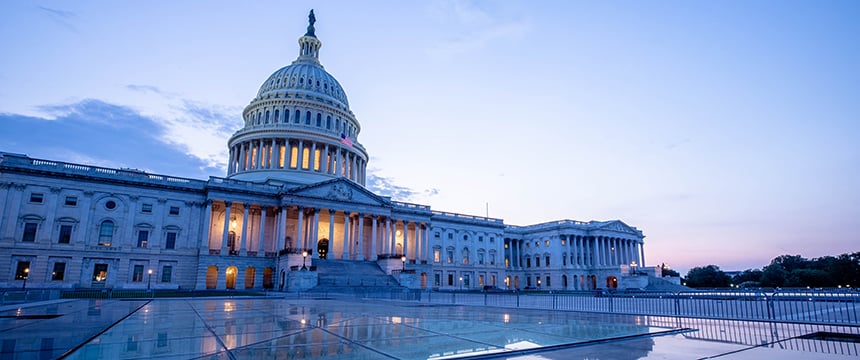
The first year of the Biden Administration marked the passage of major spending packages, including the American Rescue Plan and the Infrastructure Investment and Jobs Act. Yet, with President Biden’s social spending package, the Build Back Better Act, currently stalled in the Senate, the administration hopes to enact as much as possible of its agenda through regulatory measures. In 2022, with a slate of new policymakers appointed to federal agencies and less than a year before the midterm elections, a multitude of new regulations are poised to be proposed.
Financial Regulations
In 2021, cryptocurrency soared in value and offered an opportunity for novice investors to get involved with few barriers to entry. With their presence now in the mainstream, the public has treated them as if they are typical stocks or bonds, however their regulation status has not been deemed as such. As a new and emerging technology, regulatory agencies are attempting to regulate the markets to offer protections for investors and prevent financial crimes. Thus far, the Securities and Exchange Commission (SEC) and Commodity Futures Trading Commission (CFTC) have taken the lead on regulating digital assets. On January 26th, the SEC introduced an expansive rule to regulate entities that trade using decentralized finance (DeFi) technology. Immediately, it drew the backlash of pro-crypto SEC Commissioner Hester Peirce, who called it a “Trojan horse” designed to regulate cryptocurrency. The proposed rule had a 30 day comment period, which recently closed on February 25th. Ultimately, Congress could step in with more comprehensive legislation to establish oversight measures.
Competition Regulations
As President Biden has urged more competition within American markets, his administration is taking action. The Department of Treasury recently announced recommendations within the beer, wine, and spirits industry to promote more competition. Citing significant concentration within the beer industry, regulations would aim to reform post-Prohibition laws that have disproportionately affected small businesses and entrepreneurs. Treasury directed the Justice Department (DOJ) and Federal Trade Commission (FTC) to share a bulk of the antitrust regulation. While this regulation is still in its early stages, a newly proposed rule could be released by the end of 2022.
At a House Agriculture Committee Hearing in January, U.S. Department of Agriculture (USDA) Secretary Tom Vilsack told committee members that “farmers deserve a fair shake in the marketplace, and they don’t get a fair shake”. Following this, the USDA has been examining issuing various competition-based regulations under its authority, focusing most of its attention on the “tournament system”. The tournament system is an incentive-based contract system between chicken farmers and meatpacking companies. The USDA has cited the lack of both a competitive market and the tournament system’s clear rules of engagement between farmers and corporations. The USDA has withdrawn a Trump-era regulation on the tournament system, but it has not proposed a more comprehensive rule to follow President Biden’s executive order to increase competition within the economy.
Healthcare Regulations
A key aspect of President Biden’s Build Back Better plan is to allow Medicare to negotiate prescription drug prices. With its impasse in the Senate, the Biden Administration looks for other means to regulate drug pricing. The FTC recently considered whether to study Pharmacy Benefit Managers (PBMs) and their drug price setting practices. Ultimately, the vote failed on a 2-2 vote. The department of Health and Human Services (HHS) has recently proposed a rule on new requirements on the 340B program’s Administrative Dispute Resolution process. The rule would apply to all drug manufacturers and covered entities that participate in the 340B program. HHS has also recently proposed a rule to establish new requirements to enable certain drugs to be marketed as nonprescription drugs. The aim of this rule reflects the Biden Administration’s goal of increasing consumer access.
In late December 2021, the Environmental Protection Agency (EPA) announced that it would start requiring more stringent regulations regarding the use of ethylene oxide (EtO), citing that it is carcinogenic and can cause damage to the brain and nervous system. EtO is a common chemical used in the sterilization of medical devices such as heart valves, syringes, and catheters. The Obama Administration sought to limit the use of EtO in 2016, but the regulations were reversed under the Trump Administration. The rule could be formally announced over the coming months.
The Supreme Court ruled in late January that OSHA did not have the authority to mandate the COVID-19 vaccine or testing requirement under the emergency temporary standard (ETS) for companies with 100 employees or more. OSHA officially removed the ETS on January 26th. However, the healthcare worker vaccine or test requirement, issued by CMS, was upheld by the Supreme Court. CMS has started to implement this requirement across the states. However, the mandate is currently under continuous litigation, and could be potentially altered in the future.
OSHA has stated that will instead shift its focus towards the creation of a permanent rule on COVID-19 safety standards for the healthcare industry. The rule would include requirements such as mandatory mask-wearing, social distancing, and cleaning procedures aimed at protecting healthcare employees. In June 2021, OSHA issued a temporary rule on these requirements, however the rule expired in December 2021 and had not been renewed. Due to outside pressure from labor unions and organizations, the agency is poised to act quickly in creation of a permanent rule.
Environmental Regulations
As climate change initiatives are a crucial aspect of President Biden’s Build Back Better Act, the Administration is now looking to bypass Congress to curb its effects. EPA Administrator Michael Reagan has gone on record stating that they are looking at means to regulate air and water pollution through a variety of rules. Namely, the EPA is looking to regulate coal-fired power plants, and urge a faster transition towards alternative energy sources such as wind, solar, and hydrogen. Currently, the EPA has not yet formally proposed any rules regarding coal and oil-fired power plants. However, the EPA is currently accepting comments and could issue a formally proposed rule in 2022.
The EPA and U.S. Army Corps of Engineers’ proposed rule to erase the Trump Administration’s rules on Waters of the U.S. (WOTUS) has received a large swath of congressional and legal attention. The U.S. Supreme Court’s consideration of Sackett v. EPA could have a significant impact on the proposal. Congressional leaders have called for a pause on the rulemaking process while the Supreme Court takes the up the case. As with previous WOTUS rules, there is expected to be continuous litigation and congressional inquiry throughout the process.
The SEC has pushed for new regulations to require public companies to disclose their management of climate risk. First proposed in July 2021, the SEC would require that public companies disclose their climate change mitigation plans, greenhouse gas emissions, and climate change-related risks to investors. However, since its proposal last July, the SEC has changed their anticipated release date multiple times, drawing the ire of Democratic lawmakers, most notably Sen. Elizabeth Warren (D-MA). Democrats have urged the SEC to issue more stringent guidelines that will allow them to make up for lost ground in the climate change fight as the fate of the Build Back Better Act remains unknown. The SEC has stated that it anticipates releasing the guidelines in March, but that deadline could slip as well.
Progressive Democrats and climate change activists, frustrated by the lack of movement on the Build Back Better Act, have urged President Biden to utilize his executive powers to declare a “climate emergency”. Rep. Earl Blumenauer (D-OR) co-authored The National Climate Emergency Act alongside Rep. Alexandra Ocasio-Cortez (D-NY) and Sen. Bernie Sanders (I-VT). The bill would mandate President Biden to declare a national climate emergency. The mandate would allow the President to allocate funds from the Federal Emergency Management Agency (FEMA) to construct renewable energy systems, shut down crude oil exports, and suspend offshore drilling. The White House has stated that nothing is off the table for addressing climate change, however no rules have been proposed yet. The bill is still under consideration of the House.
2022 Outlook
With the focus on regulatory change and the implementation of the bipartisan infrastructure bill, the Biden Administration is poised to salvage its agenda while Congress continues to mull over the Build Back Better Act. A slim Democratic majority in Congress, coupled with a bleak midterm election outlook for the party, has forced President Biden to look elsewhere to enact his goals. To prepare for what’s ahead, the Foley Federal Public Affairs team is here develop and execute advocacy efforts to help your business take on any regulatory changes that 2022 could have in store.


